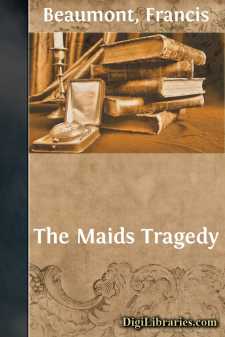Fiction
- Action & Adventure 180
- Biographical 15
- Christian 59
- Classics
- Coming of Age 5
- Contemporary Women 3
- Erotica 8
- Espionage/Intrigue 12
- Fairy Tales, Folklore & Mythology 236
- Family Life 169
- Fantasy 117
- Gay 1
- General 596
- Ghost 32
- Historical 808
- Horror 43
- Humorous 160
- Jewish 25
- Legal 4
- Medical 22
- Mystery & Detective 315
- Political 49
- Psychological 41
- Religious 64
- Romance 159
- Sagas 11
- Science Fiction 730
- Sea Stories 113
- Short Stories (single author) 537
- Sports 10
- Suspense 1
- Technological 8
- Thrillers 2
- Urban Life 31
- Visionary & Metaphysical 1
- War & Military 173
- Westerns 199
Classics Books
Sort by:
by:
Francis Beaumont
THE MAIDS TRAGEDY. Francis Beaumont and John Fletcher Persons Represented in the Play. King. Lysippus, brother to the King. Amintor, a Noble Gentleman. Evadne, Wife to Amintor. Malantius} Diphilius} Brothers to Evadne. Aspatia, troth-plight wife to Amnitor. Calianax, an old humorous Lord, and Father to Aspatia....
more...
A DAY WITH BYRON. ne February afternoon in the year 1822, about two o'clock,—for this is the hour at which his day begins,—"the most notorious personality of his century" arouses himself, in the Palazzo Lanfranchi at Pisa. George Gordon Noel, Lord Byron, languidly arises and dresses, with the assistance of his devoted valet Fletcher. Invariably he awakes in very low spirits, "in...
more...
by:
Anonymous
CHAPTER I DEFINITIONS Arena.—The space included by the boundaries of the croquet ground, within which a ball driven out of it is entitled to be placed. Blow.—The stroke of the mallet. A blow opposed to a push. Booby.—A ball that fails to run the first bridge. Bridged Ball.—A ball that has run the first bridge. Central Bridges.—Those in a line between the stakes. Chiefs.—The leaders of the...
more...
MR. SETH ATKINS The stars, like incandescent lights fed by a fast weakening dynamo, grew pale, faded, and, one by one, went out. The slate-colored sea, with its tumbling waves, changed color, becoming a light gray, then a faint blue, and, as the red sun rolled up over the edge of the eastern horizon, a brilliant sapphire, trimmed with a silver white on the shoals and along the beach at the foot of the...
more...
CHAPTER I. THE FATHER'S RETURN. She kneels beside the pauper bed, As seraphs bow while they adore! Advance with still and reverent tread, For angels have gone in before! "I wonder, oh, I wonder if he will come?" The voice which uttered these words was so anxious, so pathetic with deep feeling, that you would have loved the poor child, whose heart gave them forth, plain...
more...
by:
Alonzo Kimball
CHAPTER I I had placed the lumber inside the yard as directed, and was already rehitching the traces, when the man crossed the street slowly, switching his light cane carelessly in the air. I had noticed him before standing there in the doorway of the drug store, my attention attracted by the fashionable cut of his clothes, and the manner in which he watched me work. Now, as he rounded the heads of the...
more...
by:
Lewis Parker
To make it clear how normal everything was when the evening started out, I'll let you in at the time Willy phoned me. I was in my apartment with a lady from down the hall.... I had asked her what she liked and she'd purred, "You." I had asked her with soda or gingerale and she'd said, "Straight," so I'd obliged and poured myself a triple too and sank into the sofa...
more...
by:
Alice Brown
John Raven sat in the library of his shabby, yet dignified Boston house, waiting for Richard Powell, his nephew, whom he had summoned for an intimate talk. He was sitting by the fire making a pretense of reading the evening paper, but really he was prefiguring the coming interview, dreading it a good deal, and chiefly for the reason that there was an argument to be presented, and for this he was...
more...
by:
Edgar Jepson
CHAPTER I The rays of the September sun flooded the great halls of the old chateau of the Dukes of Charmerace, lighting up with their mellow glow the spoils of so many ages and many lands, jumbled together with the execrable taste which so often afflicts those whose only standard of value is money. The golden light warmed the panelled walls and old furniture to a dull lustre, and gave back to the...
more...
by:
John Esten Cooke
I. INTRODUCTION. The name of Lee is beloved and respected throughout the world. Men of all parties and opinions unite in this sentiment, not only those who thought and fought with him, but those most violently opposed to his political views and career. It is natural that his own people should love and honor him as their great leader and defender in a struggle of intense bitterness—that his old...
more...











